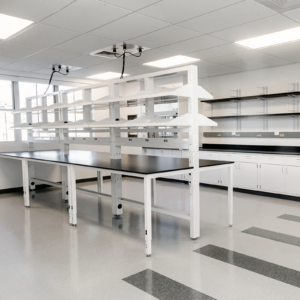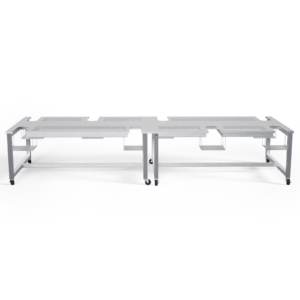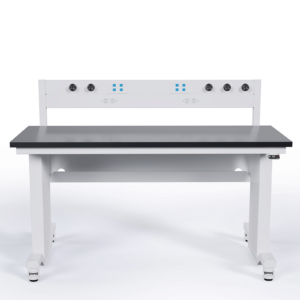As legal cannabis markets take root in individual US states and across Canada, laboratory testing companies have the opportunity to provide new quality control, testing and certification services for a wide range of botanical, edible, and infused cannabis products — for both medicinal and recreational uses.

Analysts Project Legal Cannabis Market Will Grow to $50B in Annual Sales Within Ten Years
Times are indeed changing when a 99-year-old Wall Street Brokerage firm conducts its first investor conference on the potential growth of the legal marijuana market. That was the scene this past January as Cowen & Co. briefed well-known institutional investors — including those from Fidelity Investments and Janus Capital Group* — during their “Cannabis Colloquium” event.
*You might want to check the fine print of your 401K investments more carefully from here on out to see if you are invested in cannabis!
According to a report by Cowen and Co.’s market analysts, annual sales of cannabis will skyrocket from $6 billion to a cool $50 billion by 2026 — if (and this appears to be a big ‘if’ at the moment) the Federal government legalizes cannabis sales across the US.
Cannabis laws in the United States1
Jurisdiction with legalized cannabis.
Jurisdiction with both medical and decriminalization laws.2
Jurisdiction with legal psychoactive medical cannabis.
Jurisdiction with legal non-psychoactive medical cannabis.
Jurisdiction with decriminalized cannabis possession laws.
Jurisdiction with cannabis prohibition.
1 Includes laws which have not yet gone into effect.
2 Marked states have only legal non-psychoactive medical cannabis.
Arcview Market Research is another firm conducting surveys in the cannabis market. Their latest report says that legal North American marijuana sales totaled $6.7 billion in 2016 — a whopping 30% year over year increase as more states have legalized marijuana sales. Arcview projects North American cannabis sales will reach $20.2 billion by 2021 — thanks to an astounding 25% projected compound sales growth each year.
Big Money Makes Investment Bets to Monetize Legal Cannabis Market
Now that twenty-eight states have made medical cannabis available (to a greater or lesser degree), investors are looking at ways to enter the market despite the threat of a Federal crackdown.
A San-Francisco-based startup, called Eaze, is providing an on-demand delivery service that allows its customers (scrupulously called “patients” by Eaze) to order medical cannabis (always called “medicine” by Eaze staff) at the touch of a button. To say that Eaze (which claims to be “the UBER of pot”) is ambitious is an understatement: it’s already developed a smartphone-based application that allows patients to get a medical evaluation by a doctor and, presumably, an immediate prescription for medical cannabis. If this feature takes off, one could imagine Eaze-based doctors displacing a significant number of brick-and-mortar based primary care doctors in the future as well.
CNBC has a humorous take on the medical cannabis home delivery market: they conduct a race between Eaze (pot delivery) and pizza delivery.
To date, Eaze has received $23 million in funding.
There may be many more cannabis start-ups on the way, thanks in part to Gateway, a start-up accelerator based in Oakland that’s offering its upcoming class of budding entrepreneurs (pardon the pun) access to a modern workspace, business coaching services, and a $50,000 investment — in exchange for a 5% stake.
Meanwhile, Cowen and Co.’s investment banking arm helped Canopy Growth Company (a publicly traded Canadian marijuana firm) raise $60 million this past December.
Investors are also combing traditional companies for cannabis opportunities — last year the share price of Scott’s Miracle-Gro Co. rocketed up by nearly 50%. Investors saw potential growth opportunities in its line of plant fertilizers and hydroponic gear, which they felt were well suited to the burgeoning indoor cannabis farming market.
The growth potential for cannabis sales even extends to our pets: The New York Times reports that pet owners are increasingly looking to cannabis-based products to help their pets with a range of conditions, such as anxiety, seizures, and arthritis.
Growing Need for Laboratory Testing Services to Assess Marijuana Potency, Purity, and Quality
Given the increasing consumer demand for a wide-range of cannabis-based botanical and edible products, the laboratory testing market has awoken to find a potential bonanza on their hands.
Consumers are looking for assurance that legally-acquired cannabis products they will ingest are properly tested for quality and efficacy.
Here are just a few of the cannabis testing regimens that laboratories can provide:
- Certify that the product delivers the expected levels of marijuana potency by measuring the full range of THC and CBD concentrations in the ingredients
- Certify that the product is free from foreign material contamination, including insect or rodent damage, pesticide residue, as well as excessive or dangerous minerals concentrations
- Certify that the product meets standards for the amount of bacteria living on non-sterile surfaces by performing microbial bioburden screening tests
*THC and CBD stand for tetrahydrocannabinol and cannabinoids respectively and are a measure of marijuana potency.
What is the difference between THC and CBD?
The Changing Legal Status for Medical Cannabis Across U.S. States and District of Columbia
At the Federal level, the use, possession, sale, cultivation, and transportation of cannabis are prohibited under the Controlled Substances Act of 1970. This statute classifies cannabis as a Schedule I substance, e.g. one with no “accepted medical use” and a high potential for abuse and/or dependence.
Nonetheless, in what some would call a legal gray area, eight states* have legalized the sale and possession of cannabis for both medical and recreational use.
*These states are Alaska, California, Colorado, Maine, Massachusetts, Oregon, and Washington. The District of Columbia voted to decriminalize as well; however, this effort has been overridden by Congress.
In November 2016, Arkansas, Florida, Montana and North Dakota voters approved legalizing medical cannabis, joining the majority of states which have legalized or decriminalized cannabis at least to some degree. This leaves only Idaho, South Dakota, and Kansas where cannabis is prohibited at the state level.
Mandatory Laboratory Testing of Cannabis Now Required in More US States
According to the cannabis industry trade magazine Leafly, most states that permit cannabis sales also have some level of laboratory testing requirements. Here is a brief state-by-state summary of Leafly’s report:
- Alaska: required testing by marijuana cultivation facilities
- Arizona: testing guidelines only; no state-mandated tests
- California: regulations for testing for THC and CBD (marijuana potency), solvents, chemicals, pesticides, impurities, moisture, foreign materials, heavy metals, and terpenes
- Colorado: reserves right to subject products to testing laboratories for analysis, including level of contaminants (e.g. bacteria, etc.), solvents, metals, pesticides, chemicals, microbial, filth, and potency
- Connecticut: producers to submit samples upon request to test for microbiological contaminants, mycotoxins, heavy metals, pesticide chemical residue, and active ingredients
- Delaware: dispensaries are responsible for providing detailed testing procedures and tracking
- District of Columbia: no regulations in effect at this time under the Laws & Regulations Authority for the DC Medical Marijuana Program
- Hawaii: State Department to establish and enforce standards for laboratory-based testing for content, contamination, and consistency
- Illinois: Cultivators to provide samples to approved laboratories to test for microbiological contaminants, mycotoxins, active pesticide ingredients, residual solvents, and active ingredients
- Maine: Provides guidelines for certifying organic products, prohibitions against unapproved pesticides; fees to be paid by dispensaries for laboratory testing
- Maryland: Requirements for accrediting independent testing laboratories
- Massachusetts: Requires testing laboratories to be either ISO 17025 certified or an organization approved by Dept. of Public Health. Testing includes verifying cannabinoid profiles match product labeling as well as testing for heavy metals, pesticide residues, plant growth regulators, microbiological contaminants and mycotoxins and residual solvents.
- Michigan: no current regulations requiring marijuana testing
- Minnesota: supplies must develop and implement a QA program to assess the chemical and microbiological composition of medical cannabis.
- Montana: no current regulations for testing medical cannabis
- Nevada: Independent laboratories must adopt standards such as “Cannabis Inflorescence: Standards of Identity, Analysis, and Quality Control”, “OECD Principles of Good Laboratory Practice and Compliance Monitoring” or other relevant ISO standards, or provide alternate testing protocols and procedures for approval by the state.
- New Hampshire: Testing by independent laboratories that are ISO 17025 or Clinical Laboratory Improvement Act (CLIA). Each product must be tested for its THC and CBD content (as well as other characteristics). Cultivator’s water supply and soil are to be tested annually.
- New Jersey: Unannounced testing by state regulators of product as well as soil and plant samples.
- New Mexico: Regulations limit THC concentrations to 70% by weight. Maximum moisture content limited to 15% by weight. Marijuana potency tests to be done by approved laboratories, including the quantity of THC and CBD, as well as the presence of microbiological, mycotoxin, solvent residue, and heavy metals.
- New York: Cannabis products are to be tested by a Drug Enforcement Administration (DEA) licensed laboratory located in New York State. Testing includes a long list of potential agents (from bacteria to heavy metals) that may be required by the state commissioner.
- Oregon: Laboratories must be certified in accordance with regulations published on http://www.oregon.gov/oha/mmj/Pages/laboratories.aspx
- Rhode Island: There are no current regulations for testing medical cannabis
- Vermont: The state reserves the right to have the product produced by registered dispensary tested under testing methods of its own choosing at the expense of the dispensary.
- Washington: Testing to be done by third-parting testing labs that have been certified by the state’s WSLCB. Testing labs must have a scientific director with a specified level of education and lab experience. Labs must follow most current version of the Cannabis Inflorescence and Leaf monograph published by the American Herbal Pharmacopoeia, or justify an alternate protocol as well as adhere to minimum good lab practices (GLPs). The labs must also maintain internal standard operating procedures (SOPs) and have a quality control/quality assurance (QC/QA) program as specified by the WSLCB.
Can State Jurisdictions Encourage the Cannabis Business to Grow or is a Federal Crackdown on the Horizon?
Clearly, there are many unanswered questions about the future of the cannabis market in the USA. While Canada is decriminalizing marijuana across the board, the situation here at home is more complex.
Will the current Attorney General Jeff Sessions follow up on his recent statements and begin prosecuting individual Americans for pot possession, or will the status quo standoff between state level decriminalization and federal prohibition continue?
Vivien Azer, an investment analyst at Cowen and Co. covering the cannabis market, is optimistic. She believes the recent election in Florida (in which over 70% of voters said yes to legalizing medical cannabis sales) adds to the momentum toward overall legalization sometime in the near future.
Ultimately, what happens in the future is a political and cultural question.
Looking at a recent Quinnipiac poll conducted in February 2017 showed a continued increase in favor of legalizing cannabis (with the exception of Republicans, who are strongly against.) From the poll:
- Marijuana should be made legal in the U.S., voters say 59 – 36 percent. Republicans are opposed 61 – 35 percent and voters over 65 years old are opposed 51 – 42 percent. Every other party, gender, education, age and racial group listed supports legalized marijuana.
- Voters support 93 – 6 percent legalized marijuana for medical purposes if prescribed by a doctor.
- The government should not enforce federal laws against marijuana in states that have legalized medical or recreational marijuana use, voters say 71 – 23 percent. Voters in every listed group support this position.
Will Your Laboratory Take Up the Cannabis Testing Challenge?
Is your laboratory facility considering the entering this growing field?
If so, you’ll want to watch for our upcoming article which will review what testing protocols and lab equipment is being used by today’s cannabis testing facilities.
Here at Formaspace, we’ve helped existing facilities expand to meet new market demand as well as help brand new laboratories enter the cannabis testing marketplace for the first time.
Why not let us share our expertise with you?
Contact your friendly Formaspace Design Consultant today. Just fill out the quick form below, and we’ll be in touch right away.












